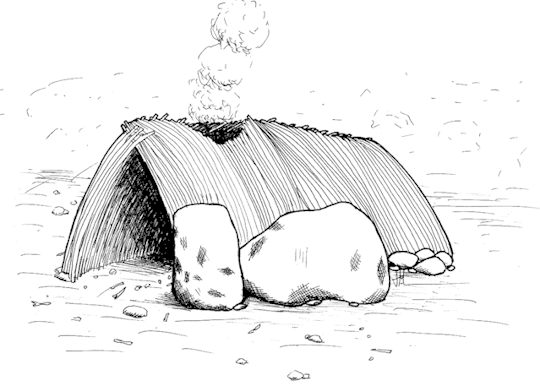#utopianism
Explore tagged Tumblr posts
Note
What's the secret to Utopia?
Everyone has a different ideal, so the secret to making an ideal and truly equal world is to all agree that I alone am right about it all.
123 notes
·
View notes
Text
I do think it is very important that we, as anarchists, take the project of understanding anarchy seriously. I think that sometimes people are so afraid of being prescriptive that they avoid being imaginative. No, we cannot and will not dictate the ways it must be; but we must imagine the many ways it could be, if we ever want it to come about.
We want a plethora of options to choose from; a thousand pictures of a possible society, knowing that none of them will be what we end up with, because no plan survives contact with reality and no plan need be followed completely.
But we know, with surety, that curiosity is absolutely the path towards a better world.
How will anarchism handle building safety? How will we respond when harms occur in our communities? How will we defend if some colonial power arises elsewhere and seeks our end?
These are not challenges to anarchy, nor are they critiques. These are the living questions we must always answer, imperfect as it will be, and always be striving to imagine new futures of.
Treat every question in good faith. Sit with it. The person who wants to ensure there is still medicine for their kid in the anarchist revolution is not your enemy, they are your friend, who is worried about their needs being met.
To me, this is why we must be utopians. We must truly believe that if we explore our options enough, we can do this in a way that is best for everyone. That it is possible for us to leave no one behind. We must believe it and we must act on it, with our intellectual labor of theory, our creative labor of envisioning, and our physical labor of building the future we want to live in, through our minute, specific, helpful, and curious daily actions.
Go, daydream, my friends.
#text post#rose baker#anarchism#anarchy as religion#religious anarchism#anarchy#prefiguration#politics#utopianism#utopia
21 notes
·
View notes
Text
“Civilization is a social plague on the planet, and vices are just as necessary to it as is a virus to disease...We must, then, apply the principle of Doubt to Civilization; we must doubt its necessity, its excellence, and its permanence.” - Charles Fourier
#philosophy#french philosophy#utopian socialism#utopianism#fourierism#quotes#philosophical quotes#charles fourier
160 notes
·
View notes
Text

Do you really live somewhere out there?
#dreamcore#suburbia#endless suburbs#liminal spaces#liminal#liminalcore#the backrooms#weirdcore#i don't remember#hostile country#people still live here#level 94#nostalgiacore#nostalgia#nostalgic#y2k nostalgia#2000s nostalgia#2000s aesthetic#early 2000s#endless neighborhood#utopianism#suburban utopia#utopia
29 notes
·
View notes
Text
Gundam X kind of explicitly states something that was subtext in Gundam and Zeta Gundam.

By being Earth-born psychics, Amuro and Tiffa are living refutations of Zeon Zum Daikun’s Newtype Theory and the Space Revolutionary Army’s Newtypism respectively.
There is no superior race, no wizards and muggles, no genetic chosen one who will bring a new age of peace (coughUnicorncough). We can’t just evolve our problems away. People with superpowers are still just people.
37 notes
·
View notes
Text
EVERYONE GET UP AND TELL ME WHAT YOU DEFINE AS UTOPIA!!!
i love hearing about visions for an ideal world, it gives us a blueprint to look back on when we're in the position to move forward!! SO tell me all about your vision. tell me how your society functions, how everything looks. tell me about the potential celebrations and holidays that would sprout from it. tell me what things there are to do. tell me what things you'd erase from this current world. tell me about the places, tell me about the shops and the areas that just exist for fun. tell me about the entertainment, the hobbies, the groups. TELL ME EVERYTHING!! I WANNA KNOW THINGS!!!
#one look through the solarpunk/hopepunk tags pretty much defines my ideal world#BUT I WANNA HEAR YOUR DEFINITIONS!!!#utopia#solarpunk#solar punk#sustainability#cozypunk#hopepunk#hope punk#hopecore#faith in humanity#community building#optimism#eutopia#utopian#utopianism#eutopian#eutopianism
14 notes
·
View notes
Text





Utopian Virtual
#utopia#utopianism#utopian virtual#utopian scholastic#virtual photography#virtual reality#virtual#SoundCloud
51 notes
·
View notes
Text
"To act on the belief that we possess the knowledge and the power which enable us to shape the processes of society entirely to our liking, knowledge which in fact we do not possess, is likely to make us do much harm."
Friedrich Hayek (1899-1992) Austrian economist.
55 notes
·
View notes
Text

Pre-Marxist communism refers to the historical, philosophical, religious, and social traditions and movements that articulated ideas akin to communism prior to the formulation of scientific socialism by Karl Marx and Friedrich Engels in the mid-19th century. These pre-Marxist traditions spanned from ancient communal practices to utopian socialist thought in the Enlightenment and early modern period. While lacking the materialist framework and class analysis central to Marxist theory, pre-Marxist communism often advocated for the abolition of private property, communal ownership of goods, economic and social equality, and collective labor, frequently grounded in moral, religious, or idealist justifications.

Long before the emergence of formal political ideologies, human communities engaged in communal practices rooted in survival, social cohesion, and the absence of surplus accumulation. In hunter-gatherer societies and early agrarian communities, collective ownership of land and resources was the norm. Anthropological and archaeological studies of Paleolithic and Neolithic societies reveal that many early human groups operated without permanent social hierarchies or formalized property systems. These egalitarian modes of existence, often termed "primitive communism" by later Marxists, were based on shared labor and mutual aid.
Such societies typically lacked private land ownership and instead organized around kinship and communal decision-making. Surpluses, when available, were distributed according to need, seasonal necessity, or customary norms. The advent of agriculture gradually led to stratification and private accumulation, but many early agrarian societies retained significant communal elements, such as collective irrigation systems and village-based landholding.

Various ancient religious and philosophical systems developed visions of social organization that reflected or idealized communal principles.
Early Christian communities, particularly as described in the Acts of the Apostles, practiced a form of communal living in which property was held in common and distributed according to need (Acts 2:44–45, 4:32–35). Inspired by the teachings of Jesus Christ, these communities emphasized moral equality, humility, and shared wealth. Church Fathers like Basil the Great and John Chrysostom criticized wealth accumulation and promoted almsgiving and community welfare, seeing poverty not as natural but as the result of social injustice. While not advocating systematic revolution, these teachings laid a moral groundwork for later critiques of private property.
In South Asia, both Buddhism and Jainism promoted monastic traditions based on communal living and renunciation of possessions. Monks and nuns lived in collectives where personal property was minimal or forbidden, and work was shared. While these traditions emphasized spiritual liberation rather than social reform, they proposed an alternative mode of life that rejected the accumulation of wealth and stressed ethical conduct and compassion for all beings.
Plato, particularly in his work The Republic, imagined an ideal society in which the guardian class shared property, spouses, and children to prevent corruption by private interest and promote unity. Though hierarchical and not democratic, Plato’s vision rejected private property among the elite as inherently divisive. Later philosophers like the Cynics and Stoics also expressed disdain for material wealth and advocated simpler, communal lifestyles.

During the feudal period, numerous peasant uprisings were driven by grievances against landowners, taxes, and inequality, often expressing proto-communistic ideals. The 1381 English Peasants’ Revolt and the 1525 German Peasants' War, although diverse in motivation, included demands for the abolition of serfdom, communal use of land, and egalitarian social structures. In many cases, these uprisings were infused with millenarian religious zeal, imagining a future egalitarian order as the fulfillment of divine justice.
Groups such as the Waldensians, Lollards, and Taborites challenged both Church and secular authority, denouncing wealth and advocating for a return to apostolic poverty. Among the most radical were the Anabaptists of the 16th century, especially in the Münster Rebellion (1534–1535), where leaders like Jan van Leiden briefly established a theocratic communal society. The community abolished private property and implemented common ownership, although it was also marked by authoritarian rule and violent suppression. Despite their failure, these movements represented early attempts to realize communal principles through collective action.
During the mid-17th century English Civil War, groups like the Levellers and Diggers emerged advocating political and economic egalitarianism. The Diggers, led by Gerrard Winstanley, established communal farms on common land, proclaiming that "the Earth was made a common treasury for all." While the Levellers focused more on democratic reforms, the Diggers explicitly opposed private property and the existing class structure. Their philosophical justification was both religious and rationalist, anticipating later socialist thought.

The 18th and early 19th centuries saw the emergence of utopian socialism, which, while not termed "communism" in every instance, laid the intellectual foundation for modern socialist and communist theory. These thinkers criticized capitalist inequality and private property, advocating various forms of cooperative or communal living.
A relatively obscure Enlightenment thinker, Morelly authored Code de la Nature (1755), which proposed the elimination of private property, inheritance, and money. In his ideal society, goods would be stored in public repositories and distributed according to need, with citizens working cooperatively in occupations suited to their abilities. Morelly’s work prefigured many elements of Marxist communism but lacked a theory of class struggle or historical development.
Although not a communist, Rousseau's critique of private property in Discourse on the Origin and Basis of Inequality Among Men (1755) deeply influenced later communists. Rousseau argued that the institution of private property led to the rise of inequality, domination, and moral corruption, and he idealized a more egalitarian, communal past.
Often regarded as the first revolutionary communist, Babeuf led the Conspiracy of Equals during the French Revolution, aiming to overthrow the Directory and establish a classless, egalitarian republic based on common ownership. Influenced by Rousseau, he advocated the abolition of private property and the organization of labor for the collective good. Although the conspiracy was suppressed in 1797, Babeuf's vision deeply influenced later communist movements and thinkers, including Marx.
Fourier imagined a society organized into small, self-sufficient communities called phalansteries, where work would be organized cooperatively and passions harmonized. He envisioned the abolition of wage labor and believed that human fulfillment required collective living and shared resources. Fourier’s ideas were often eccentric, but his critique of capitalism and advocacy for communal living were influential in 19th-century socialist circles.
A Welsh industrialist-turned-reformer, Owen implemented proto-communist practices in his factories and attempted to establish utopian communities such as New Harmony in Indiana (1825). He believed that character was shaped by social conditions and that cooperative living could create rational, moral individuals. While his communities failed, Owen became a leading figure in cooperative and early socialist movements in Britain.
Blanqui was a revolutionary who, while not a theorist of communism in the Marxist sense, advocated for a revolutionary vanguard to seize power and implement economic equality. His emphasis on insurrection and a temporary dictatorship of revolutionaries as a means to egalitarian ends had lasting influence on revolutionary strategy in later communist thought.

Although many of the aforementioned figures and movements held ideas akin to communism, the term "communism" itself began to gain more formal ideological identity in the early 19th century, prior to Marx and Engels.
The term communisme emerged in French political discourse during the 1830s and 1840s. Figures such as Étienne Cabet, Théodore Dézamy, and Wilhelm Weitling began using it to denote visions of a society organized around collective ownership and equality. Cabet’s Icarians founded communal settlements in the United States, pursuing a practical application of his Christian-communist ideas as described in Voyage en Icarie (1840).
A secret revolutionary society founded by German émigrés in Paris, the League of the Just espoused radical egalitarian principles and called for the abolition of private property. It later evolved into the Communist League, under the influence of Marx and Engels, but its roots were firmly in the moral and religious radicalism of earlier pre-Marxist communism.
A German tailor and radical, Weitling combined millenarian Christianity with early proletarian consciousness. In works like Guarantees of Harmony and Freedom, he called for the establishment of a classless, communal society by means of revolutionary action. Marx later criticized Weitling’s moralistic and non-materialist approach, but he acknowledged his importance as a pioneer in worker-oriented communism.

Pre-Marxist communism encompasses a diverse array of traditions, movements, and ideas united by their opposition to private property, social hierarchy, and economic inequality. Whether rooted in religious doctrine, philosophical idealism, or utopian imagination, these early forms of communism laid the ethical and conceptual groundwork for the later development of scientific socialism. While lacking the historical materialist framework and systemic critique of capitalism that would define Marxist communism, these early expressions were nonetheless foundational in articulating humanity’s recurring aspiration for a more just and egalitarian society.
#communism#socialism#utopianism#pre marxist communism#utopian socialism#radical history#historical materialism#commune#early communism#egalitarianism#anarchism#political philosophy#political history#leftist theory#history nerd#revolutionary thought#marxist theory#class struggle#anti feudal#philosophy blog#social history#critical theory#anti oppression#intellectual history#diggers#levellers#early christianity#history community#post long read#tumblr think piece
6 notes
·
View notes
Text
(Understanding) is not an ideal, it is not something to be achieved in the never-never land of some far-distant Utopia. Understanding is now, not in the future. Understanding is action.
Understanding doesn’t come first, and action later; action and realization are inseparable. In the very moment of seeing a cobra, there is action. If the truth of all that we have been talking about this morning is seen, then action is inherent in that perception. But we are so caught up in words, in the stimulating things of the intellect, that words and intellect become a hindrance to action. So-called intellectual understanding is only the hearing of verbal explanations, or the listening to ideas, and such understanding has no significance, as the mere description of food has no point to a hungry man. Either you understand, or you don’t. Understanding is a total process, it is not separated from action, nor is it the result of time.
— Jiddu Krishnamurti
#Ideal#Idealism#Utopianism#Understanding#Philosophy#Psychology#Spirituality#Education#Action#Total Action#Krishnamurti
3 notes
·
View notes
Text
Phrase that came to my mind: "You can't bullshit your way to utopia."
I imagine it being said by some sardonic mid-20th century science fiction protagonist out of Asimov or Heinlein, but I suppose it's pretty applicable to a lot of discourse.
2 notes
·
View notes
Text
Utopianism: The Antidote to Doomerism
Utopianism involves creating an image of a "utopia" in your mind. You don't use this as a blueprint, but instead as a guide to help plan the future.
For example, you can plan how an accessible future would look like, where kids, the elderly, the disabled, and the mentally ill are all accommodated and treated kindly. Next, you create realistic, concrete, & material goals. These goals act as your roadmap.
Some "concrete goals" would include:
Changing a specific law
Changing regulations to make a specific area more accessible (ramps at concerts, childcare areas at college campuses, healthcare being more affordable, rehabilitation instead of for-profit-prisons, etc)
etc
So you imagine an "ideal world" and then make a list of material goals to use as an actual guide. Be prepared for things to go wrong or for more research to be needed. Your image of an "ideal world" is SUPPOSED to look unrealistic. Think of it as a "shoot for the stars and you'll land on the moon" situation.
Check out this video to learn more:
youtube
#lgbtqia#lgbt#lgbtq#lgbtq+#queer#politics#us politics#world politics#gen z#doomerism#utopianism#youtube#philosophy#leftism#direct action#Youtube
6 notes
·
View notes
Text

7 notes
·
View notes
Text

@moms4liberty is what happens when a customer complaint makes a wish upon a burning cross to become a political movement and starts wanting to speak with all the managers.
[The Daily Don]
* * * *
"Totalitarianism is not only hell, but all the dream of paradise - the age-old dream of a world where everybody would live in harmony, united by a single common will and faith, without secrets from one another. Andre Breton, too, dreamed of this paradise when he talked about the glass house in which he longed to live. If totalitarianism did not exploit these archetypes, which are deep inside us all and rooted deep in all religions, it could never attract so many people, especially during the early phases of its existence.
Once the dream of paradise starts to turn into reality, however, here and there people begin to crop up who stand in its way. and so the rulers of paradise must build a little gulag on the side of Eden. In the course of time this gulag grows ever bigger and more perfect, while the adjoining paradise gets even smaller and poorer."
- Milan Kundera The Book of Laughter and Forgetting
[thanks to whiskey river]
#Daily Don#Moms for Liberty#Jesse Duquette#whiskeyriver#Milan Kundera#The book of laughter and forgetting#tortalitarianism#utopianism
33 notes
·
View notes
Text
I saw a description that characterized urban planning as an inherently utopian field because you're constantly working towards creating a better future for your city that is a long lasting project you will probably never see the finality of.
And that really spoke to me
5 notes
·
View notes